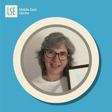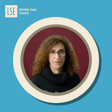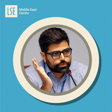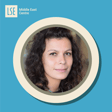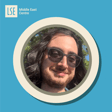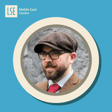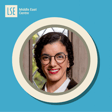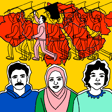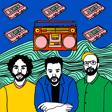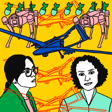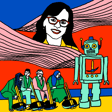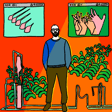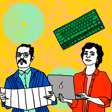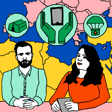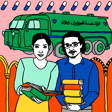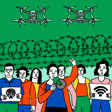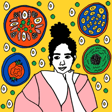Become a Creator today!Start creating today - Share your story with the world!
Start for free
00:00:00
00:00:01

Episode 3: Ahlam Chemlali on Hybrid Positionality and Vulnerable Communities
In this episode, Anne Kirstine speaks with Ahlam Chemlali about her research among migrant women stuck in transit in North Africa. Ahlam explains how her own migrant background as well as her identity as a mother plays out in her fieldwork, and shares her thoughts on ethics and the recent developments within the literature in researcher positionality.
Ahlam is a PhD fellow at the Danish Institute for International studies. Her research focuses on the topics of migration, border politics and practices of border violence in the North African borderlands. She previously worked as a Program Manager at DIGNITY - the Danish Institute Against Torture. Ahlam currently serves as an expert advisor on peace and migration.
Transcript
Introduction to Podcast Series
00:00:02
Speaker
Hello and welcome to Conversations on Positionality, a podcast brought to you by the LSE Middle East Centre. My name is Anne Kirsten Rohn.
Influence of Identity on Research
00:00:13
Speaker
I'm a visiting fellow at the Centre and you're listening to the third episode in this podcast series, which explores how who we are as researchers shape the work we do.
00:00:24
Speaker
In my own research, I often travel to contexts different from the one I grew up in, and talk to people whose lives differ significantly from mine. And that has made me think a lot about how my nationality, gender, age and personality play out in my relations with people in the field.
00:00:43
Speaker
It has also made me wonder how we as researchers can become more aware of the challenges and opportunities that come with our positionalities, and how we can talk more about positionality in general within our academic institutions.
Meet Ehelem Chemleri
00:00:57
Speaker
In this episode, I have invited Ehelem Chemleri to discuss these questions with me.
00:01:04
Speaker
Ahlam is a PhD fellow at the Danish Institute for International Studies and she just came back to Denmark after four months as a visiting scholar at the UCLA and Yale. Ahlam's research is centered around the topics of migration, border politics and practices of border violence in the North African borderlands. A main focus in her PhD is on West African migrant women who are stuck in transit along the African European migration route.
00:01:32
Speaker
And one of the things I look forward to discussing with her is how she tackles the ethical dilemmas that might arise when doing research about some of the world's most vulnerable people.
From Practitioner to PhD
00:01:44
Speaker
I'm also curious to hear about Ahlem's work as a practitioner, because prior to her PhD, she worked nine years as a program manager at Dignity, the Danish Institute Against Torture. And currently, she serves as an expert advisor in several fora, including the Peace and Stabilization Response Team at the Danish Ministry of Foreign Affairs. So with that introduction, I think it's time to say welcome to the podcast, Ahlem. Thank you so much, and thank you for having me.
00:02:13
Speaker
It's a pleasure for me to have you. Ahlem, in this podcast, we will talk about your journey as a practitioner and as a researcher and how you have reflected on your positionality throughout that journey. And I think a good place to begin that conversation is by talking about how you learned about positionality as a phenomenon. Do you remember when you first came across the term and how have you come to understand the meaning of the term throughout the years you've worked as a researcher and practitioner?
00:02:44
Speaker
Well, I think it's an ongoing journey actually. And to be honest, as a practitioner, I didn't actually think of positionalities in the same way as when I started my PhD.
Fieldwork in Tunisia: Identity Challenges
00:02:58
Speaker
As I worked in the field, I was part of an organization and there was a mandate and an identity and a brand behind me. But as a PhD in the field, you are just yourself.
00:03:11
Speaker
And that requires you to really face your identity and your positionality in a very, very different and direct way. I was not that introduced to the whole field of positionality and thinking about all of these social markers that we carry with us. But it's something that I really was confronted with, especially after my first round of fieldwork in Tunisia.
00:03:37
Speaker
And I think that's also why I'm now very interested in how to talk about these issues. And also that it's not just methodological and ethical questions, but it's also, I think, political. Hmm. So before we started recording this podcast, one of the things we talked about was the fact that your parents are from Morocco. Can you describe that part of your identity maybe and what that means for your positionality in the field?
00:04:08
Speaker
I think as a migration researcher with a migrant background, positionality matters even more. And this is not just because this position is often problematized in an already very increasingly politicized field, which migration has become, but also because it further unveils the complexities and power dynamics that exists in the field. So in my fieldwork among West African migrant women in transit,
00:04:36
Speaker
My roots, my North African roots, and also my Danish nationality and my insider outsider positions really were challenged. And also there is an asymmetric power relation that really also became a shaping factor. So during my fieldwork in Palazzar, which is a poor urban neighborhood in the Northern parts of Tunis, the capital, I very quickly realized how my own
00:05:03
Speaker
hybrid identity as a researcher from the so-called Global North, but also women of color and a mother. And also the fact that I had North African roots and my parents had migrated from Morocco to Denmark. And also that I wasn't Tunisian were positionalities that I really couldn't hide from. And to give you an example,
00:05:27
Speaker
At first, when I approached the migrant women, I would, you know, approach them as I normally would. So, you know, hi, I'm a researcher from, you know, I'm interested in migration and would you be able, and they would sometimes just walk away or shut down completely.
00:05:45
Speaker
And initially I was a bit confused because I thought this would not be difficult for me. I had experienced, you know, from my work prior to my PhD of working with these issues. So I felt I had the experience to do this. And so I finally managed to have just an informal chat with some women outside of a hair salon.
00:06:07
Speaker
I said something about, I just arrived to Tunisia and they were Ivorian. So they spoke in French and they were like, oh, you're not Tunisian. And I was like, no, I'm not. And the whole atmosphere and relation just changed instantly. And I really realized that, okay, because, you know, my physical appearance gave them the idea that I was Tunisian.
00:06:32
Speaker
This created fear and tensions for the West African women. And during my fieldwork, I would realize that there were very bad experiences with Tunisian women for many of the West African women who had worked as maids for wealthy Tunisian families, or just in the everyday life, you know, as hostility between the groups were growing.
00:06:57
Speaker
So to navigate that, I actively started to use my Danish Moroccan identity. So I would be like, I'm not Tunisian as some of the first things I would say to them to introduce myself. And this actually changed my whole field work with the women. And suddenly I was also perceived as an insider because I was like them, not from the country.
Motherhood and Fieldwork
00:07:23
Speaker
And another part of positionality and fieldwork in general is also sharing yourself because they are sharing so much as well. So them getting to know me and also that I was born in Europe and that my mother had also migrated and that was something they aspired to. So they were suddenly talking about my mother as a woman who had made the right decisions and they were also wanting to do the same. So suddenly my own families.
00:07:52
Speaker
mobility history was driving my field research, which was not what I at all had expected. That's a very interesting anecdote, an example, I think, of how one comes to learn about their positionality. I would like to pick up on something you said about being a mother. So you had your child and your partner with you in the field.
00:08:15
Speaker
Did you use your identity as a mother actively when approaching interviewees and human beings in the field? Well, not at first at all. But I have a published paper about motherhood now from my fieldwork, which I never expected. So it became a big topic. And that is also, I think, one of the wonderful things about fieldwork
00:08:39
Speaker
that you really never know what will come out of it. So I think being a mother and having my child at the time he was two years old with me and my husband was, well, a necessity for me to have a long-term fieldwork, but also I wasn't hiding it. Sometimes when I would talk to the women and often they were mothers themselves with small children, that became a natural subject. So it wasn't something that I kind of
00:09:09
Speaker
strategically used as an identity, but it became kind of common ground where we could talk about just being mothers and frustrations, but also, you know, struggles and insecurities as a parent and about our, you know, dreams for our children. And I think that also changed their perception of me because I was suddenly not just, you know, a researcher, but I also was seen as a whole person.
00:09:39
Speaker
And they would even be very concerned about me spending too much time with them. So they would be like, oh, you've been here too long. You have to go back home to your son and your husband. They're waiting for you. And also during, you could say free time, if such a thing ever exists when you're in the field, I would be at the local playground with my son who would be playing.
00:10:02
Speaker
And occasionally some of the migrant women would also be there either with their own children or sometimes as nannies for expat families. And, you know, it would open a whole new space that was completely, you know, outside of the kind of research space where it felt like, you know, interview or whatever participant observations. And I think these kinds of also serendipitous encounters and unexpected conversations wouldn't otherwise have taken place.
00:10:31
Speaker
And so I think in these instances I was again perceived differently as a mother first and often as a tired mother like them as well. And I think that that opened up again a whole different kind of positionality where we found this kind of universal common ground.
Positionality in Field Research
00:10:51
Speaker
These things you tell about your fieldwork experiences really make me wonder, to which extent do you think we can prepare our positionality before entering the field at all? And to which extent is our research a positionality something that we have to negotiate while being in the field? Definitely. It's a field. It's a topic that needs to be taught more in terms of preparing students and researchers before going into the field.
00:11:21
Speaker
in many of the kind of methodological courses I took. There was more emphasis on, you know, methods in terms of data and ethics, but positionality was kind of not at the center. But I think it's also a difficult thing to prepare because you don't know who you will meet and how you will be perceived as well. You know, as I mentioned, I didn't think that my North African roots would create
00:11:50
Speaker
those kind of challenges for me in the beginning. But then again, I could also use it strategically. For instance, with Tunisians or with like local CSOs or NGOs, I was welcomed as a Maghribiya, so like a North African fellow. And the Maghreb countries, we have the kind of similar, you know, local dialects, Dadija, and they could quickly, you know, identify me just from speaking Dadija that I was obviously not Tunisian.
00:12:20
Speaker
And then I would be like, I have Moroccan roots. And that would be an access that another European researcher would not have. And we would be talking about all sorts of whatever, local or regional music or food and discuss which couscous was best and stuff like that. I still think the Moroccan is the best.
00:12:41
Speaker
But so I think that also, even though it was challenging at first with the West African community, it also gave me access with Tunisians and local NGOs and CSOs. And on the opposite end, when I met with UN or EU diplomats or officials,
00:13:02
Speaker
I was perceived as a Danish PhD scholar, so I had access and power and privileges, which is also inaccessible to many local researchers. In a sense, I could, during a typical day in the field, navigate several of these insider-outsider positions intentionally and also unintentionally.
00:13:25
Speaker
All of these issues of power imbalance and also hierarchies, I think are very important to be considered and not just taken for granted. And that's why I really think that prior to field work, but also during field work and especially coming back from field work, we really must ask ourselves, who are you in this world and how can we make who we are in the world more central to our research from the beginning?
Ethical Challenges in Research
00:13:51
Speaker
For me, being neither of West African origin,
00:13:55
Speaker
which is the group I'm looking at or Tunisian which is the country I'm doing my research in really also implies that I really fitted neither of these archetypal outsider insider researcher positions. One thing you mentioned before which I think is important to
00:14:12
Speaker
bring up and delve into is this power relationship between you and your interlocutors in the field. Because obviously, as I said before, the people you deal with in your research, the people you talk to, the people whose life and experience you portray in your research,
00:14:32
Speaker
are some of the most vulnerable individuals, perhaps even in the world. So what ethical dilemmas does that put you in? And I'm thinking specifically, how do you deal with the fact that you're much more privileged than the people you talk to? And at the same time, I suppose you also want to maintain an equal relationship with them. That's an excellent question and an ongoing issue. And as you say,
00:15:01
Speaker
many of the migrant women that I've been working with. They are obviously also in a precarious situation. And I also was very cautious of, and this might sound, yeah, wrong, but I wouldn't be able to change their legal status. Again, as a practice worker, there were, you know, a legal team that I could refer these people to, but that was not the case as a PhD.
00:15:30
Speaker
I think it's important from the very beginning to explain your role and why you're there. And also my research is not interesting for them sometimes. I mean, externalization politics, what is that when you're looking at everyday life for an undocumented resident? So for me, it really also changed my way of thinking my own research. I was suddenly also more interested in how they navigated their everyday lives.
00:15:59
Speaker
So I think it's a very like blurry, messy relationship. And many also have an expectation that if they talk with you, then they will get something out of it. It could be like monetary, but mostly people wanted to improve their living conditions or situations. So obviously I would be careful in not promising anything. I could, of course, and I also did spend a lot of time
00:16:29
Speaker
trying to understand all the bureaucracy in Tunisia to see if there were any opportunities or any local organizations that I could bring some of the women in touch with and vice versa. And I think that's not a requirement at all, but it was something I felt I maybe had the resources to do. But I think it is a very, very tricky
00:16:51
Speaker
situation, but also being very transparent and honest is a way to deal with that. So clearly, there is a power inequality and the fact that, you know, I could travel back and forth while they were still stuck in transit, it was just a very, very in your face factor in our relationships. And also many of them that I'm still in touch with, we have very
00:17:16
Speaker
strong relationship built now over years and they know that I'm not an activist per se. So now they're also approaching me in a sense that they want me to speak out. So for instance, over the summer there was a migration crisis again happening in Indonesia and many of them would be sending me pictures of videos and asking me to please talk about what's happening.
00:17:41
Speaker
So they kind of also know my role in a sense. I will not unfortunately be able to grant them asylum or anything, but I would be able to write about what's happening and amplify their voices and their situation.
00:17:57
Speaker
I think I can recognize these dilemmas from my own work as well in Lebanon, which is a country that over the past years has undergone a really serious economic crisis and where some of the people I speak to are struggling to just make ends meet. And that has also made me reflect on how I make my role clear to them. So I've started being also actually saying more and more transparent about the
Fieldwork Insights: US-Mexico vs. North Africa
00:18:21
Speaker
fact that I'm someone who can channel their voices
00:18:24
Speaker
onto a different sphere and also just explaining them why their voices are interesting or why their voices are important and relevant. And I think that does make a difference in the way that people approach me from the onset of an interview.
00:18:40
Speaker
Exactly. That's the most important part. I mean, being transparent from the get-go and also very clear and also setting boundaries, I think is also important. And even so, it can still get very messy. And when you get close to people that are really struggling and in difficult situations,
00:18:59
Speaker
We're all human and we can talk about, you know, researcher objectivity and stuff like that, but it just gets, you know, very entangled when you do field work with a group over long term. And that's also fine. It doesn't have to be clear cut because not all research or even human relations are like that. But I think really transparency and do no harm is some of the key questions in this.
00:19:28
Speaker
I completely agree with you, and I think you're right that we need to acknowledge that it's natural, and also just sometimes unavoidable, that our relations with interlocutors get blurred. But I would like to move away from your research in North Africa now, and talk about another experience you've had. Because, as I said in the introduction, you just came back from a research day in the US, and on that research day, you were taken on field trips to the borderland between US and Mexico.
00:19:57
Speaker
So can you say a bit about how you experienced your positionality on these field trips? Was it different from when you were in Tunisia? And if so, how? Yes. Well, I had the privilege during my research day to be invited to kind of a research seminar field trip to El Paso in Southern Texas and also in Juarez, Mexico.
00:20:21
Speaker
And for me, I mean, I obviously took it as a learning experience. It's not a geography I'm looking at, but to my surprise, and this is unfortunate of course, but there were so many parallels to my own field and to the North African Mediterranean context.
00:20:38
Speaker
in terms of how violence was being used as a means to deter. And also the stories of the migrants I met having spent months and months crossing several borders to just end up in long-term uncertainty in transit in Mexico. And I was speaking to the group I was in because I was actually the only one who wasn't working on US-Mexico migration.
00:21:03
Speaker
So I was telling them that this really reminds me of Tunisia, of the Tunisian coast guard that I interviewed, you know, after meeting the US border guards. So in a sense, I did kind of perceive myself as again, being this kind of third party position when you clearly not part of either the migrant population or the majority population, which is the American in that context.
00:21:29
Speaker
But also, I think that it's the same position that I had in my own field because I'm not part of the West African group or the Tunisian. And I was also perceived even by some of the US scholars as some sort of insider by proxy. So you are an immigrant researcher, you have a migrant background, but from another group than the one being studied, such a background can create
00:21:57
Speaker
a sense of commonality, even though it's not the same national group, but it kind of transcends this ethno-national divide. That makes me think of something you said in the beginning of our conversation, that you feel positionality is an ongoing learning process.
Understanding Positionality's Influence
00:22:15
Speaker
If you should pass on some of that learning to researchers or students who are about to go on field work, what would you advise them to consider?
00:22:26
Speaker
Well, I think one of the initial questions I think we must ask ourselves is who are you in the world and, you know, how to make that central to our work from the beginning. And I think the kind of you in the relation is a way to kind of position oneself in these relations, either when teaching about field work or, you know, ethnographic decisions, dilemmas or solutions.
00:22:54
Speaker
And I think this is also beyond just the PhD or doctoral training, academic training, but also your personal background or non-academic experiences and how they kind of also inform the perspectives that you will bring in and that you really carry with you. So I think that's some of the questions I maybe should have asked myself, but it's also good to reflect upon it afterwards.
00:23:21
Speaker
In relation to that, you mentioned before we started the podcast that you think the literature on positionality takes sort of the Western researcher as its point of departure. And I was wondering if you could elaborate on that.
Beyond Insider-Outsider Frameworks
00:23:34
Speaker
You know, you have all the classical pieces. Obviously in the beginning, there was this going native idea, and then this insider-outsider dichotomy. And I think we are beyond that now, having again,
00:23:49
Speaker
a very diverse academic group growing and also researchers like myself with a migrant background working on migration as well. So I think these kind of ways of thinking positionality needs to be challenged. And a paper I would like to recommend is called Beyond the Insider-Outsider Divide in Migration Research.
00:24:15
Speaker
by Kaling et al, published in Migration Studies. And I think in that paper, they really dissect, you know, the archetypal insider-outsider divide, but also complicating it with these different third positions in migration research that really deviate. And that's why I enjoyed that paper, because it kind of looks beyond that old way of thinking positionality, which is very like stereotypical
00:24:43
Speaker
Either you're part of the majority population and you're doing research on a minority population or vice versa. Either you're inside or an outside. But I think reality today, the world today is much more complex than that. So I would often look for these articles that look beyond that and then also includes researchers with different backgrounds and minorities.
00:25:11
Speaker
That's a very nice place to end our conversation, which has made me think a lot about these hybrid positionalities and how to think of the blurred line between different forms of positionality.
Episode Conclusion and Preview
00:25:24
Speaker
So I would very much like to thank you for joining me on this podcast. And I hope that we can get to talk about these things in another setting sometime in the future, because I think we're not done talking about these issues.
00:25:38
Speaker
Thank you so much. It's been a pleasure and I really hope that we can continue this conversation. And that was the end of the third episode of Conversations on Precisionality. Thank you to the team at the LSE Middle East Centre for their work on the podcast and thank you to the listeners for tuning in. In next week's episode, I continue the conversation together with Nadine Milcak from American University of Beirut.
00:26:05
Speaker
Nadim and I both do research on Lebanese opposition, but unlike me, Nadim is an insider to his research field. He's both Lebanese and has been involved in an opposition group himself, and will discuss the advantages and downsides that come with his positionality. It's going to be a really interesting conversation, so I hope you'll listen in.
